If you're looking to create soothing tea combinations, consider using chamomile, lavender, and lemon balm. Chamomile is great for calming your nerves and promoting sleep. Lavender's soothing aroma can help you unwind after a long day, while lemon balm adds a delightful lemony scent that eases stress. Valerian root is excellent for improving sleep quality, and thyme's comforting aroma promotes relaxation. You might also find peppermint invigorating and sage beneficial for mindfulness. Each herb brings unique flavors and calming effects that can enhance your tea experience. There's much more to explore in the world of herbal teas!
Chamomile for Calmness
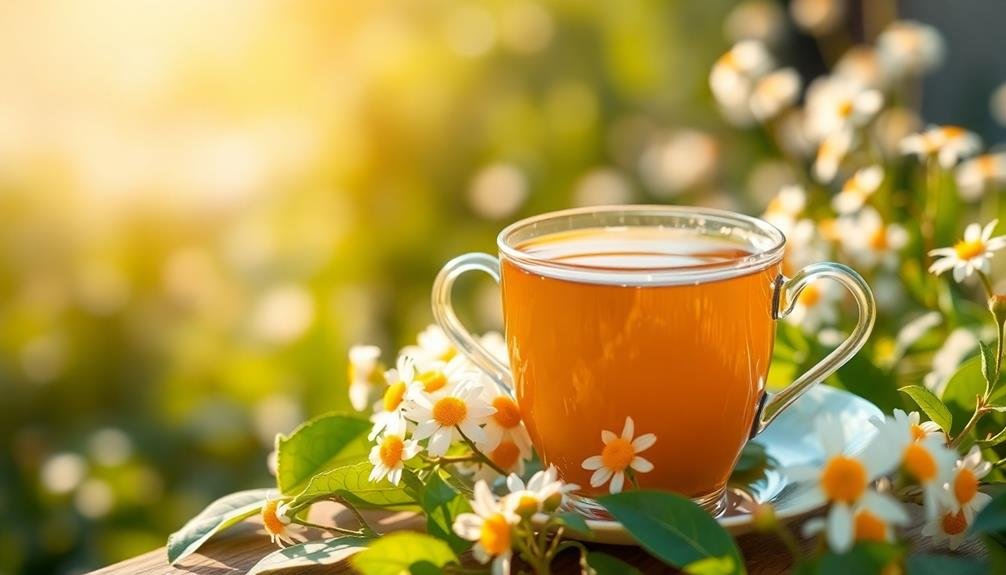
When you're feeling overwhelmed, chamomile tea can be your soothing ally. This herbal infusion has been cherished for centuries, thanks to its calming properties. When you sip on chamomile tea, you're not just enjoying a flavorful drink; you're also giving your body a gentle nudge toward relaxation.
Chamomile contains apigenin, an antioxidant that binds to specific receptors in your brain. This action can help reduce anxiety and promote sleep. If you've had a long day or are struggling with racing thoughts, a warm cup of chamomile can help quiet your mind.
It's particularly effective in the evening, signaling your body that it's time to unwind. You can enhance your chamomile experience by adding a touch of honey or lemon, which not only boosts the flavor but also provides additional health benefits.
Consider brewing a cup before bedtime, creating a calming ritual that prepares you for a restful night.
Lavender's Relaxing Properties
Lavender brings a sense of tranquility that many seek in their daily lives. Known for its soothing aroma, lavender has been used for centuries to promote relaxation and alleviate stress. When you sip on lavender tea, you're not just enjoying a delightful flavor; you're also tapping into its calming properties that can ease anxiety and improve your mood.
Studies show that inhaling lavender scent or consuming it can lower cortisol levels, a hormone associated with stress. This means that enjoying a warm cup of lavender tea can help create a peaceful environment, making it an excellent choice before bedtime.
The gentle floral notes can also help you unwind after a hectic day, allowing you to shift into a state of relaxation. Incorporating lavender into your tea blends can elevate your experience even further.
Pairing it with chamomile or lemon balm enhances its calming effects, creating a perfect bedtime brew. So, if you're looking to cultivate a serene atmosphere or simply want to relax after a long day, consider brewing a cup of lavender tea.
You'll find its soothing properties provide the relief you've been craving.
Peppermint for Stress Relief
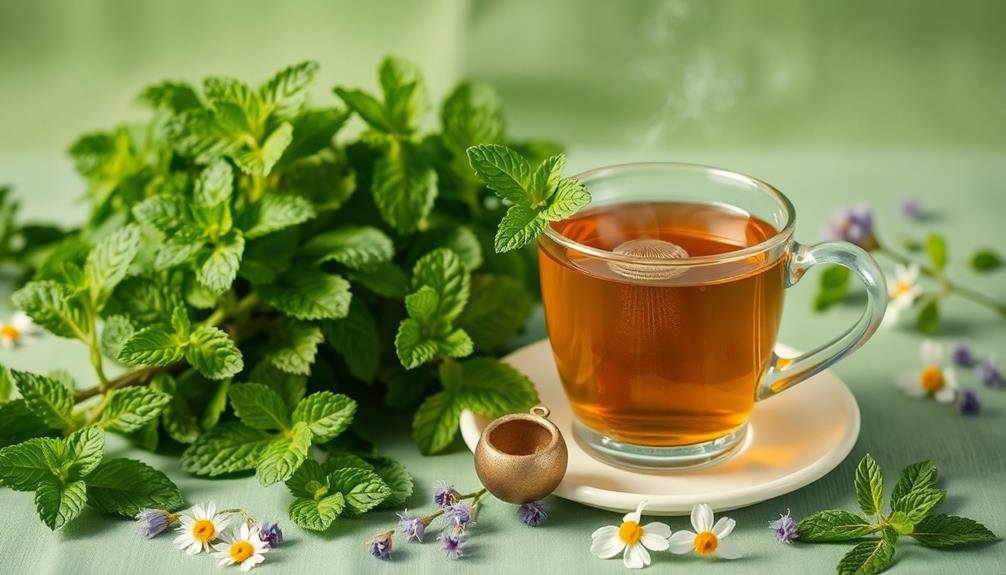
Peppermint tea is a fantastic choice when you need to unwind and relieve stress. Its invigorating aroma and flavor not only elevate your mood but also come with several health benefits.
Let's explore how to brew the perfect cup and make the most of peppermint's soothing properties.
Benefits of Peppermint Tea
Stress can often feel overwhelming, but a warm cup of peppermint tea offers a rejuvenating way to unwind. This delightful herbal tea not only tantalizes your taste buds but also provides several benefits that can help alleviate stress.
Here's why you should consider reaching for that peppermint tea:
- Aromatherapy Effects: The invigorating scent of peppermint can help clear your mind and promote relaxation.
- Digestive Relief: If stress causes stomach discomfort, peppermint tea can ease digestion and soothe your gut.
- Mental Clarity: The menthol in peppermint can enhance focus and concentration, making it easier for you to tackle tasks.
- Muscle Relaxation: Sipping on peppermint tea can help relieve muscle tension, allowing you to physically relax after a long day.
Incorporating peppermint tea into your routine can be a simple yet effective way to manage stress.
So the next time you're feeling overwhelmed, brew yourself a cup of peppermint tea and take a moment to breathe deeply.
You'll find that it not only calms your mind but also refreshes your spirit, helping you face challenges with renewed energy.
Brewing Tips and Techniques
A perfect cup of peppermint tea can make all the difference when you're looking to unwind. To brew it effectively, start with fresh peppermint leaves if possible. If you're using dried leaves, verify they're high-quality and aromatic. Measure about one tablespoon of loose leaves or one teabag per cup of water.
Bring your water to a boil, then let it cool for just a minute—around 200°F is ideal. Pour the hot water over the leaves or teabag, and let it steep for 5 to 10 minutes, depending on how strong you like it. The longer you steep, the more intense the flavor and calming benefits.
If you want to enhance the soothing properties, consider adding a bit of honey or lemon. Honey can amplify sweetness while lemon adds a zesty twist that complements peppermint beautifully.
Lemon Balm's Soothing Effects
Lemon balm is known for its calming properties, making it a perfect addition to your tea routine.
You'll find that its soothing effects can help ease stress and promote relaxation.
Plus, it pairs wonderfully with other ingredients to enhance your tea experience.
Calming Properties of Lemon Balm
When it comes to finding relief from daily tensions, lemon balm often stands out as a powerful ally. This herb, known for its delightful lemony scent, has been used for centuries to promote relaxation and reduce stress.
You'll love how lemon balm can help calm your mind and body after a long day.
Here are four key calming properties of lemon balm:
- Anxiety Reduction: Lemon balm helps lower anxiety levels by promoting a sense of tranquility.
- Sleep Aid: It's known to improve sleep quality, making it easier for you to drift off into a restful slumber.
- Mood Enhancer: The herb can elevate your mood, helping to stave off feelings of melancholy or irritability.
- Digestive Comfort: Lemon balm can also soothe digestive discomfort, which often contributes to stress and anxiety.
Best Tea Pairings
To enhance the soothing effects of lemon balm, consider pairing it with other calming teas that complement its properties. For instance, chamomile is a fantastic addition. Its gentle, floral notes and mild sedative effects work harmoniously with lemon balm, creating a soothing blend perfect for winding down after a long day.
Another excellent pairing is lavender. The aromatic qualities of lavender not only promote relaxation but also enhance the overall flavor profile of your tea. Together with lemon balm, they create a fragrant and calming brew that can help ease anxiety and promote restful sleep.
You might also try combining lemon balm with passion flower. Known for its anxiety-reducing effects, passion flower can deepen the calming experience, making it an ideal choice for those seeking tranquility.
Finally, consider adding a touch of peppermint. While it has a slightly invigorating effect, the combination with lemon balm creates a revitalizing yet relaxing tea that can help with digestion and stress relief.
Experimenting with these pairings can lead to delightful discoveries, so don't hesitate to find your perfect soothing blend! Enjoy the journey to relaxation through these harmonious tea combinations.
Valerian Root for Sleep
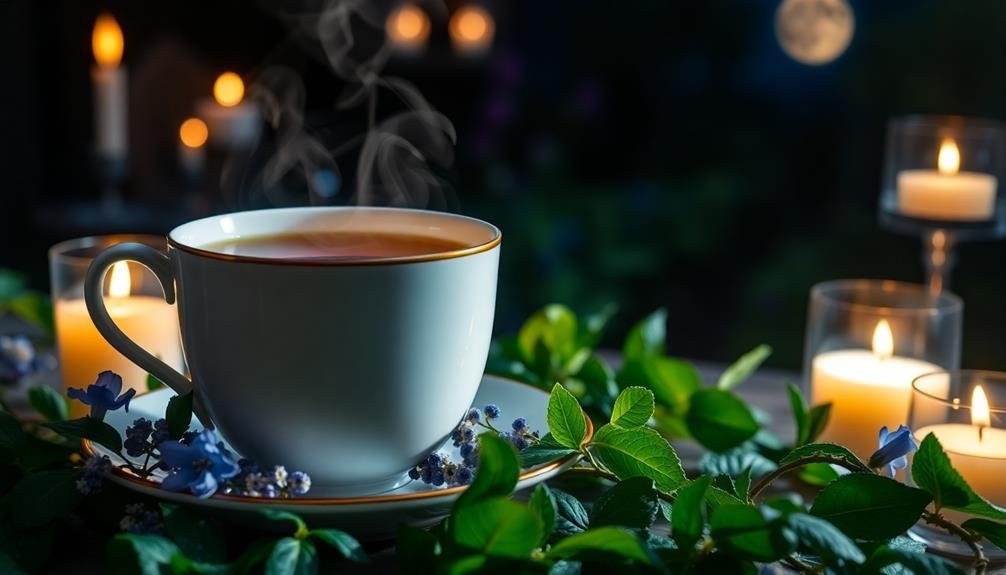
Valerian root has long been celebrated as a natural remedy for sleep issues. If you're struggling to catch those elusive Zs, this herb might just be your new best friend. Known for its calming properties, valerian root can help you relax and drift off to sleep more easily.
Here's why you should consider incorporating it into your nighttime routine:
- Promotes Relaxation: Valerian root helps soothe anxiety and tension, allowing your mind to unwind before bed.
- Improves Sleep Quality: Many users report deeper, more restorative sleep after using valerian, waking up feeling refreshed.
- Reduces Sleep Latency: It may help you fall asleep faster, so you can maximize your rest.
- Non-Habit Forming: Unlike some sleep medications, valerian root is generally non-habit forming, making it a safer option for occasional use.
To enjoy its benefits, brew valerian root tea about 30 minutes before you plan to sleep.
Combine it with other calming herbs like chamomile or lemon balm for added relaxation.
With valerian root in your corner, sweet dreams could be just a cup away!
Passionflower's Tranquil Qualities
If you're on the lookout for a natural way to ease stress and promote relaxation, passionflower might just be what you need. This enchanting plant has been used for centuries in traditional medicine, celebrated for its calming effects. When you brew a cup of passionflower tea, you're not just enjoying a pleasant taste; you're also tapping into its tranquil qualities.
Passionflower contains compounds like flavonoids and alkaloids, which help soothe anxiety and reduce restlessness. You'll find that sipping on this tea can create a sense of peace, making it an excellent choice for winding down after a long day.
It's particularly beneficial if you struggle with racing thoughts, as it can help quiet your mind and prepare you for a restful night. Moreover, passionflower's mild sedative properties make it perfect for those moments when you need to unwind.
Whether you're facing a stressful day at work or simply want to relax in the evening, a warm cup of passionflower tea can work wonders. So, the next time you feel overwhelmed, reach for passionflower and let its calming essence wash over you.
Sage for Mindfulness

Sage is a powerful ally for cultivating mindfulness and enhancing mental clarity. This aromatic herb isn't just for cooking; it's also a fantastic addition to your tea routine. When you sip sage tea, you're not only treating your taste buds but also creating a serene space for your mind.
Here's how sage can help you cultivate mindfulness:
- Promotes Relaxation: Sage has calming properties that can help reduce anxiety and tension, allowing you to focus on the present moment.
- Enhances Focus: The compounds in sage may improve cognitive function, making it easier for you to concentrate during meditation or daily tasks.
- Supports Memory: Regular consumption of sage tea has been linked to improved memory and mental performance, which can deepen your mindfulness practice.
- Encourages Reflection: The warm, earthy flavor encourages you to slow down, creating an opportunity for introspection and self-awareness.
Incorporating sage into your tea routine can transform your experience and support your journey toward greater mindfulness.
Thyme's Comforting Aroma
Thyme's calming properties can transform your tea experience, making it a perfect choice for relaxation.
When you blend thyme with other herbs, you create a soothing aroma that enhances both flavor and tranquility.
Let's explore how this versatile herb can elevate your tea blends.
Thyme's Calming Properties
With its warm, earthy scent, thyme offers a comforting aroma that can soothe your mind and body. This herb isn't just a flavorful addition to your meals; it also boasts calming properties that can help you unwind after a long day.
When you brew thyme tea, you might notice several benefits, including:
- Reduced Anxiety: Thyme can help calm racing thoughts, making it easier for you to relax.
- Improved Sleep Quality: Drinking thyme tea before bed may promote a deeper, more restful sleep.
- Respiratory Relief: Its soothing properties can help ease tension in your chest, making it easier to breathe.
- Digestive Aid: Thyme can support healthy digestion, which may alleviate discomfort and promote relaxation.
You'll find that thyme's calming effects can enhance your overall well-being. The aroma alone can transport you to a tranquil space, easing stress and fostering a sense of peace.
Blending With Other Herbs
While you might enjoy thyme on its own, blending it with other herbs can elevate its soothing qualities and create a more complex flavor profile. Pairing thyme with chamomile brings a sweet, floral note that complements thyme's earthiness. This combination is perfect for winding down after a long day, helping you relax and enjoy a peaceful moment.
Another excellent pairing is thyme and lemon balm. Lemon balm's mild citrus flavor adds brightness, balancing thyme's comforting aroma. This duo not only tastes delightful but also enhances your mood, making it ideal for sipping during stressful times.
If you're seeking a bolder flavor, try blending thyme with peppermint. The revitalizing taste of peppermint can invigorate your senses while still providing the calming benefits of thyme. This mix is great for easing digestive discomfort, too.
Don't forget about adding ginger for a little spice. Ginger's warmth combined with thyme can create an exceptionally soothing tea, especially during colds or when you need extra comfort.
Experiment with these combinations to discover which blends resonate with you, and enjoy the delightful variations that thyme can bring to your tea experience.
Ginger for Warmth
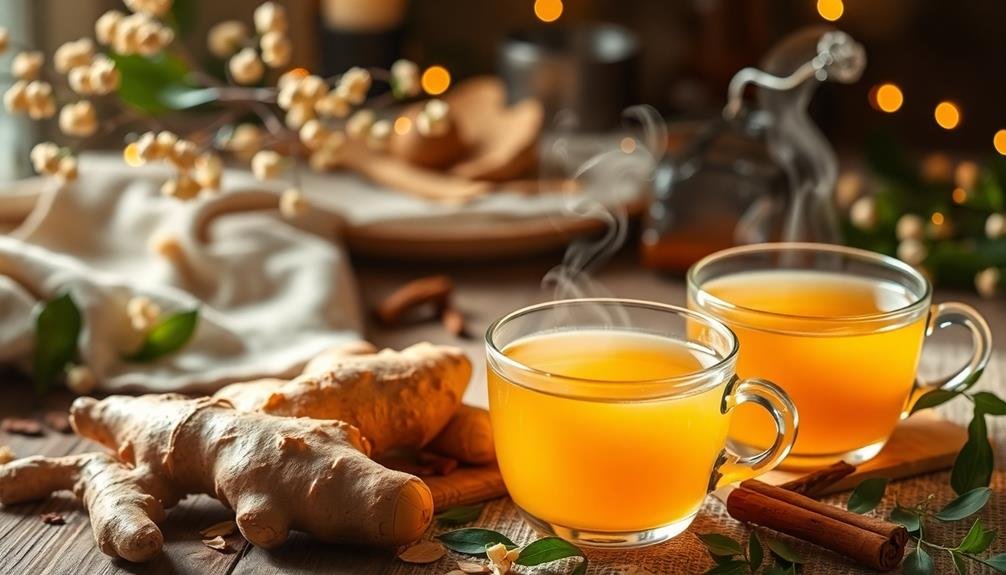
Ginger warms you from the inside out, making it a perfect ingredient for soothing tea combinations. This versatile root not only adds a delightful zing but also brings a host of health benefits that can enhance your tea experience.
Here are four reasons to incorporate ginger into your next brew:
- Digestive Aid: Ginger can help ease nausea and improve digestion, making it an excellent choice after a meal.
- Anti-Inflammatory: Its natural anti-inflammatory properties may help relieve aches and pains, providing comfort during colder months.
- Immune Booster: Ginger is rich in antioxidants and can support your immune system, helping you stay healthy.
- Mood Enhancer: The warming sensation of ginger can uplift your spirits, making your tea time feel even more comforting.
To make a soothing ginger tea, simply slice fresh ginger and steep it in hot water for about 10 minutes. You can also mix in honey or lemon for added flavor and health benefits.
Next time you're looking for warmth and comfort, reach for ginger and enjoy its soothing embrace in your tea.
Rosemary for Clarity
Rosemary isn't just a fragrant herb; it's also known for its ability to enhance mental clarity and focus. When you brew a cup of rosemary tea, you're not just enjoying a delightful flavor; you're tapping into its potential to sharpen your mind. The compounds in rosemary, like rosmarinic acid and camphor, can stimulate your brain, helping you feel more alert and focused.
Incorporating rosemary into your tea routine can be especially beneficial during those long study sessions or when you're tackling a challenging project. You'll find that sipping on this herbal infusion can boost your concentration and keep distractions at bay.
To create a soothing rosemary tea, steep fresh or dried rosemary leaves in hot water for about 5-10 minutes. You can mix it with other herbs, like lemon balm or peppermint, to create a rejuvenating blend. Adding a touch of honey can enhance the flavor and provide a touch of sweetness.
Next time you need a mental boost, consider reaching for rosemary. You'll appreciate how this simple herb can elevate your focus and clarity, turning your tea time into a productive moment. Enjoy your herbal journey!
Frequently Asked Questions
Can I Mix Different Herbs for a Soothing Tea Blend?
Yes, you can definitely mix different herbs for a soothing tea blend! Experiment with combinations like chamomile, lavender, and lemon balm; they'll create a calming experience, helping you relax and unwind after a long day.
Are There Any Side Effects From Drinking Herbal Teas?
Drinking herbal teas can have side effects, like stomach upset or allergic reactions. You should pay attention to your body's signals and consult a healthcare professional if you experience any unusual symptoms after consuming them.
How Often Should I Drink Herbal Tea for Relaxation?
You can drink herbal tea daily for relaxation, but listen to your body. Start with one or two cups, then adjust based on how you feel. Enjoy the calming effects without overdoing it.
What Is the Best Time of Day to Drink Calming Tea?
The best time to drink calming tea is in the evening, as it helps you unwind after a busy day. Sipping it before bedtime can promote relaxation, making it easier for you to sleep soundly.
Can Herbal Teas Interact With Medications or Health Conditions?
Yes, herbal teas can interact with medications or health conditions. It's essential you check with your healthcare provider before incorporating them into your routine, as some herbs may amplify or reduce the effects of your medications.
In Summary
Incorporating these herbs into your tea routine can transform your moments of stress into serene experiences. Whether you choose chamomile for calmness or ginger for warmth, each herb offers its unique benefits to soothe your mind and body. Experiment with different combinations to find your perfect blend, and enjoy the calming ritual of brewing a cup. So, take a moment for yourself, sip your tea, and let nature's soothing properties work their magic.

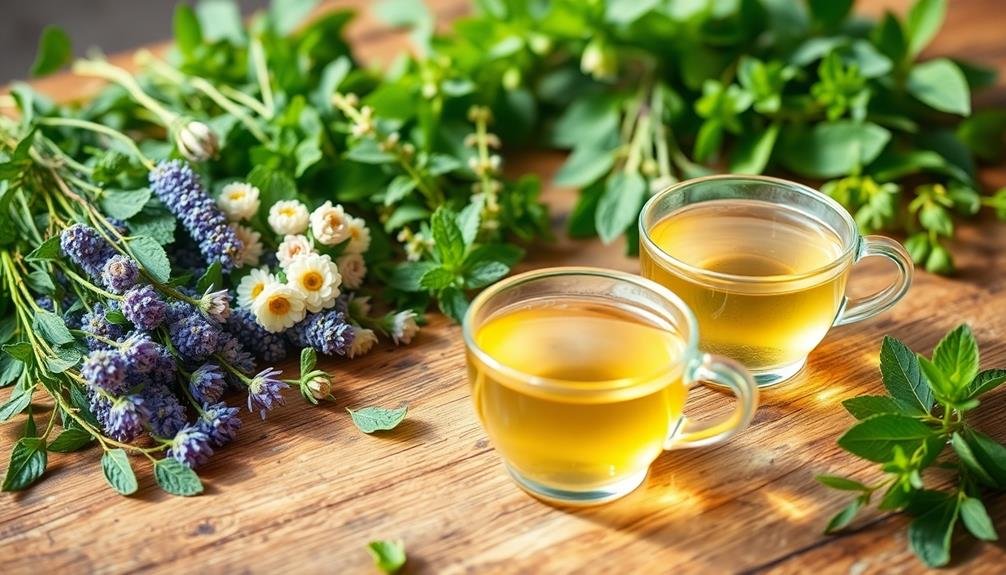

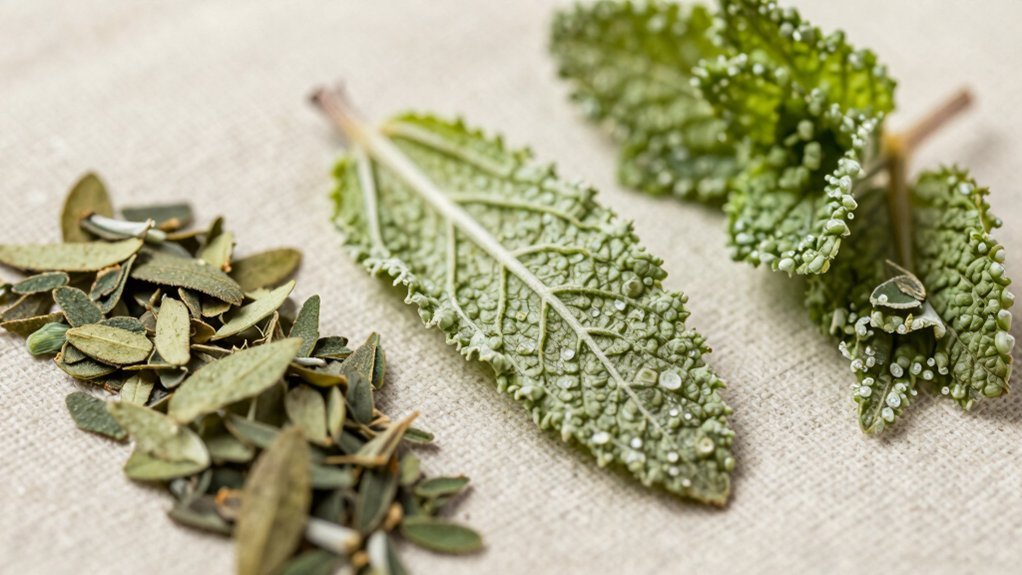

Leave a Reply